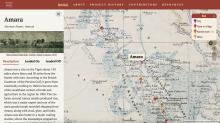The Svoboda Diaries Project (SDP) is a digital humanities and historical preservation project founded in 2006 in the department of Middle Eastern Languages and Cultures. This project utilizes a collection of diaries written by Joseph Mathia Svoboda between 1862 and 1908, in which Joseph recorded his life and travels as a purser on a British steamship traveling the Tigris River between Baghdad and Basreh. These diaries afford us a glimpse into over 40 years of Ottoman Iraq through Joseph’s life, including information about weather, personal and public life, politics, trade on the Tigris, and more.
In recent years, SDP has been working on some projects centered around the geographical content of Joseph’s diaries, specifically the locations that he mentions throughout his journeys on the steamship. One of these projects, the Rivermap, was released this September, and is the culmination of five years of work by many SDP team members. The goal of this project was to create a visual of the journeys that Joseph Svoboda describes in his diaries and was born of the vision of several former SDP team members, including the late Professor Walter Andrews and Adeline Perkins, a former intern.
The Rivermap depicts the human geography of the Tigris River in the late 19th and early 20th century based on content from the diaries and other sources from the time period. Interns compiled locations that Joseph mentioned in his diaries from his journeys and cross referenced the locations onto historical maps of the region. Currently, the project contains locations from diaries 12, 29, 47, and 49-53. Clicking on the locations on the interactive map reveals information about the location, such as its alternate spellings, historical information about location, and the goods that were loaded and off-loaded from Joseph’s ship at that location. With all of these additional features offered on the Rivermap website, the project has evolved into more than just a visual of Joseph’s journeys but is also an exploratory tool for users to better understand the geography of the Tigris River and the locations that Joseph visited throughout his journeys.
Another recent project involving the landscape depicted in the Svoboda Diaries was completed by Jolie Zhou for her senior thesis, advised by Dr. Annie T. Chen. This project sought to address challenges that can occur with geoparsing, the task of assigning coordinates to locations extracted from text when working with historical corpora, and more specifically, the Svoboda Diaries. Joseph Svoboda’s diaries are primarily written in English, though there are some location names that are transliterated from Arabic, as he was living and working in Iraq. These transliterations, as well as the fact that some of the locations mentioned by Joseph in his diaries are historical and do not exist anymore, make it challenging to link places referenced in the diaries to present-day locations in knowledge bases such as Wikidata and GeoNames. Jolie’s project examined how data augmentation via candidate name generation could increase the effectiveness of geoparsing methods on historical corpora. Her paper proposes a pipeline using augmented candidate location name generation and clustering methods to find plausible geo-coordinates for locations in the text. Jolie’s paper was presented at the ACL 2024 Student Research Workshop this summer in Bangkok, Thailand. We congratulate Jolie on this great achievement!
The SDP work spans a variety of areas, including UX design, web development, content curation, data science, historical contextualization, transcription, and historical preservation. These two projects demonstrate the potential impact, range, and possibilities that SDP and other digital humanities projects offer. To keep updated on the latest developments from SDP, check out the website with information about the history of the project, team members, current projects, as well as access to the published diaries with transcriptions, image gallery, and travel journal.
